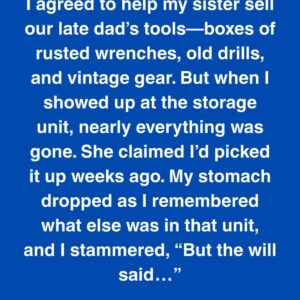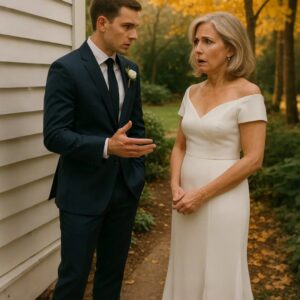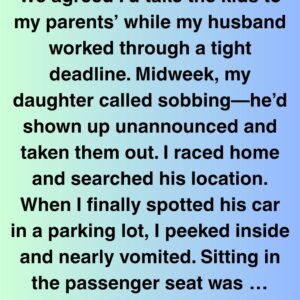
We were barely ten minutes into the drive when Leni—my niece—pulled out that glittery purple pouch from her lap like it had been there the whole time.
I did a double take.
“Where’d you get that?” I asked.
She smiled, twisting the string around her fingers. “The man gave it to me. He said it’s just for me because I was the only one who could see the lines.”
I thought maybe she meant some performer at the festival we’d just left. Leni’s the kind of kid who zones in on weird details—patterns in grass, shadows on ceilings. So I laughed it off at first.
Until I realized: I never saw her carrying that thing when I buckled her in.
And I definitely didn’t see any man talking to her. It was just us, her brother, and a few tired food vendors packing up.
When I peeked inside the pouch, it was empty.
But the inside shimmered—like the reflection of streetlights on water. It didn’t feel like fabric. More like…glass? Or light? I couldn’t explain it, and I didn’t want to scare her, so I zipped it shut and handed it back.
She hugged it to her chest like it was a secret.
That night, I tucked Leni and her brother into bed at my place. Their mom—my sister—was out of town for work, and I was on aunt duty for the week. Leni placed the pouch on the nightstand beside her pillow and whispered something to it before falling asleep.
I stood there watching her for a moment. Something about the way she smiled in her sleep gave me chills. Not fear. Just that weird sensation you get when something is out of place, but you can’t say why.
The next morning, she woke up before anyone else and tiptoed into the kitchen with the pouch still clutched in her hand.
“Can we go to the park?” she asked, barely waiting for me to pour my coffee.
“It’s not even eight,” I said, yawning. “Why the rush?”
“He told me there’s something waiting there. But only for today.”
I blinked at her. “The man in the uniform?”
She nodded.
I rubbed my temples. “Okay, Leni. Just—what kind of uniform was it?”
She tilted her head. “Old. Brown. Like from one of those movies Grandpa watches. But his hat was shiny. And he had stars on his collar.”
I nearly dropped the mug.
My grandfather had served in World War II. His medals were in a box in the attic. Leni had seen them once when she was four. But she wouldn’t remember the details. At least, not like that.
Still, I told myself kids imagine things all the time. Maybe she’d seen a reenactor or something at the festival and I hadn’t noticed.
I told her we could go after breakfast. She was patient—but kept glancing at the window, like someone was waiting outside.
We walked to the park around ten. Leni ran ahead, giggling, spinning in circles with the pouch swinging from her wrist. I let her play while I sat on a bench scrolling through my phone.
Then I heard her call out. “Auntie! Look!”
I looked up—and my heart stopped.
She was kneeling near the old war memorial, a bronze statue of a soldier that had stood in that park since before I was born. At the base of the statue was a small box. Wooden. Polished. With a delicate flower carved on top.
I walked over slowly.
“Where did that come from?” I asked, crouching beside her.
“It was here when I got close. He told me to look under the flower.”
I hesitated. “Who told you?”
She pointed at the statue. “Him.”
I swallowed hard. “You mean the man in the statue?”
She nodded.
I didn’t see anyone else nearby. No pranksters. No weirdos. Just birds chirping and a mom jogging with her toddler in a stroller.
With trembling fingers, I lifted the lid of the box. Inside was a letter. Folded neatly. Yellowed with age. The ink was faded, but still legible.
“To my little girl, if you ever find this—know that I love you.”
That was the first line.
I read it out loud, carefully. The letter continued, talking about the war, regrets, and a promise to come home. It was signed, “Your papa, Joseph G.”
I stared at the signature.
My grandfather’s name was Joseph. Joseph Galloway.
I sat down hard on the bench.
That statue—we always assumed it was just a generic soldier. There was no nameplate. The story was that it was a tribute to all veterans. But now, holding that letter, I wasn’t so sure.
Leni opened the pouch and placed the letter inside. When she zipped it shut, the shimmer faded. It looked…normal. Just a child’s sparkly bag again.
Then she looked up at me and said, “He said that was all he needed. Now he can rest.”
That night, I dug through the attic. The medal box was still there. But now, beside it, was something new.
A faded photo of my grandfather in uniform—standing in front of that same statue. Younger. Smiling.
On the back, written in pencil, was a date: June 6, 1944. D-Day.
And a note: “If this ever finds its way back home, maybe she’ll forgive me.”
I sat on the attic floor, stunned.
My grandmother died when I was ten. She never talked much about the war. Just said he came back “a different man.” But they’d had a falling out early on, before he shipped off. She never explained it.
The letter—the pouch—it didn’t feel like a coincidence anymore.
The next morning, Leni was different. Calmer. Less distracted. Like a weight had been lifted.
I asked her if she saw the man again.
She shook her head. “No. But he said thank you.”
A few days later, I took the letter to a local museum. They confirmed it was genuine. The ink, the paper—it all matched the era. They even traced the writing style to soldiers from that particular infantry division.
I didn’t tell them about the pouch. Or the statue.
Some things don’t need explaining.
I decided to frame the letter and give it to my mom. When I handed it to her, she cried. She hadn’t seen her father’s handwriting in over thirty years.
“That’s his,” she whispered. “That’s really him.”
That evening, I noticed the statue at the park had been cleaned. The grime was gone. Fresh flowers had been placed at its base.
And now, a nameplate had been added.
“Joseph Galloway – In Loving Memory”
I asked the city about it. They said a man had dropped off the plate with proper documentation weeks ago, but they’d only just installed it.
The name on the paperwork?
Richard Galloway. My grandfather’s brother. Who had disappeared after the war. No records. Nothing.
But that’s impossible.
We thought Richard died in 1947.
Leni’s pouch sits on her shelf now. She doesn’t carry it around anymore. It doesn’t shimmer. It’s just a sparkly bag.
Or maybe its job is done.
A few weeks later, she started drawing lines in her sketchbook—paths, rivers, stars, things that looked like they belonged in a map or an old compass. I asked her what they were.
She shrugged. “I just follow where they lead.”
I still don’t know how to explain any of it.
But I’ve stopped trying.
Sometimes, life gives you a chance to fix what was broken—through love, through children, through strange, quiet magic that no one else sees.
Maybe Leni was chosen because she still believes in the unseen. Or maybe kids just understand things we adults forgot how to feel.
I do know this: forgiveness travels farther than we think. Across time. Across generations. Even across worlds we don’t understand.
That day in the park wasn’t about a ghost or a mystery.
It was about a man who never got to say sorry.
And a little girl who was still willing to listen.
If you’ve ever felt the weight of an old silence, an apology left unsaid—maybe it’s not too late. Maybe, like my niece, you’re the one meant to help it find its way home.
Thanks for reading. If this story touched you, share it with someone who needs to hear it. And don’t forget to like the post—it helps more stories like this reach those who need them most.





